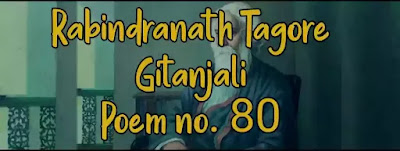Also Read
I am like a remnant of a cloud of autumn uselessly roaming in the sky, O my sun ever-glorious! Thy touch has not yet melted my vapour, making me one with thy light, and thus I count months and years separated from thee.
If this be thy wish and if this be thy play, then take this fleeting emptiness of mine, paint it with colours, gild it with gold, float it on the wanton wind and spread it in varied wonders.
And again when it shall be thy wish to end this play at night, I shall melt and vanish away in the dark, or it may be in a smile of the white morning, in a coolness of purity transparent.
Summary
The inevitable aim of Tagore is lying under the lines of this lyric, too. In one way or other he pleas God for the religious, pure and ecstatic union of his zone with the divine and eternal one. Tagore now takes a form of a cloud in his imagination. The image of cloud is again an example of his love for nature and the romantic attitude of his writing. The cloud symbolizes the freedom of soul. The poet in the guise of cloud is still untouched by the heavenly light. The poet wishes to be illuminated by the brightness of the God which is ever glorious like sun. The poet is aware or his earthly life which acts barrier between him and the heavenly spirit. He pleas that God must melt his earthly being with His radiant glow and warmth, the heat of love into vapour to be dissolved within Him. The poet demands an end to this earthly life and an indispensable union with God.
The poet is counting the days of unbearable seperation. He says that if the Almighty doesn't want to meet his existence then let He should play with this wanton cloud. He requests Him with that His warmth care and glory let it be gilded with His golden glory and let him be a source of God's play or His enjoyment. In one way or other he wishes to be taken in care by Him. Tagore wants himself to be a small concern of Him even if He is playing with him like a toy he would be very happy.
After His play, he wants his soul to be dissolved and melted away in the darkness of night or in the transparent cool, pure light of the morning. Let it become one with the divine.
Critical Analysis
The theme is still the same the dream of being one with the Immanent soul. This is depicted in a different style, with different images and in different words. The sun is the bright, ever glorious embodiment of the Almighty and the empty, wanton cloud symbolizes the hollow existence of the man.
"If this be thy wish and if this be thy pla, then take this fleeting emptiness of mine, pait it with the colours, gild it with gold, float it on the wanton wind and spread it in varied wonders."
Using a highly poetic and figurative language, the poet expresses his intense yearning for reunion or rather communion with the Divine. The poet expressed a sense of humility and worthlessness. It is God's divine touch which at times irradiate him. Yet he is pining in separation from God. God is like the ever-glorious sun, and poet is like a remnant of vapoury mist which shuts out light.
This is Tagore's belief that God has created this world and the man for His joy. He says to God that either He can make this emptiness of his shine like gold or make it vanish away in the dark, at his will. This creation is His lila and He takes joy in its beauty as a child takes joy in his toys. God plays with the beautiful colours, light and shade of this creation. The poet prays to Him to put an end to the earthly existence so that his soul may fuse and merge with the wondrous beauty of his creation and thus may become a suitable plaything for Him. At present it is entirely useless.
Annotations
Remnant: remaining part, small piece. Gild: give a golden surface. Wanton: uncontrolled, abandoned. Transparent: allows light to pass.
